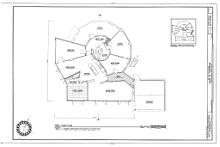House of Tomorrow (Indiana)
|
House of Tomorrow | |
 | |
|
House of Tomorrow, Century of Progress Architectural District | |
 | |
| Location | 214 Lake Front Dr., Beverly Shores, Indiana |
|---|---|
| Coordinates | 41°41′3″N 87°0′6″W / 41.68417°N 87.00167°WCoordinates: 41°41′3″N 87°0′6″W / 41.68417°N 87.00167°W |
| Built | 1933 |
| Architect | Walter Scholer, George Fred Keck,[1] et al. |
| Part of | Beverly Shores-Century of Progress Architectural District (#86001472[2]) |
| Added to NRHP | June 30, 1986 |
The House of Tomorrow at 241 West Lake Front Drive, Beverly Shores, Indiana, was originally part of Chicago's 1933-34 Century of Progress Exposition. Designed as the house of the future, this house included its own airplane hangar. Glass walls offered views from every angle and so taxed the experimental air conditioning system that the cooling system failed.[3]
1933 Century of Progress Exposition
The House of Tomorrow was built for the Century of Progress' 1933 Homes of Tomorrow Exhibition in Chicago, Illinois. Architect George Fred Keck's design reflected European modernism. The design conveyed the ideals of the fair and its emphasis on science and technology.[4] Keck said he 'discovered' solar heating when he found workers inside the house wearing only shirtsleeves on a frigid winter day.[5][6]
Bartlett Development
After the close of the Century of Progress, the structure was sold to Robert Bartlett for $2,500. Bartlett was developing a residential subdivision in Beverly Shores, Indiana. The house was placed on a barge and moved across Lake Michigan to Indiana. In April 1938, Bartlett sold the house to become a private residence.[7]
Design

The building was dodecagonal in design using aluminum fascia with vermiculite interior walls. Plate glass walls are the most notable feature of the building. An airplane hangar was included, set four feet lower than the ground floor.[8] When the house was moved to Beverly Shores, the ground floor was modified to make use of the garage and airplane hangar for living space. A carport was added. Windows were modified so that the occupants could open and close them to control the internal environment.[9] The interior is designed around a central staircase in the dodecagonal prism structure. Most rooms are wedge shaped.
Restoration efforts
Restoration efforts on the House of Tomorrow House were started in 1997, with the Indiana Dunes National Lakeshore and Indiana Landmarks searching for potential lessees to restore the building.[10] As of 2011, the Park Service is once again looking for a long-term renter to complete the restoration of the property. The previous renter vacated the property after the restoration cost estimates exceeded previous budgeted amounts. The current restoration cost is estimated at $2 million.
See also
| Wikimedia Commons has media related to: |
References
- ↑ Roth, Leland M. American Architecture: A History, (Google Books), Westview Press, 2003, p. 361, (ISBN 0813336627).
- ↑ Staff (2009-03-13). "National Register Information System". National Register of Historic Places. National Park Service.
- ↑ Cultural Sites of Indiana Dunes National Lakeshore; National Park Service, Indiana Dunes National Lakeshore; Porter, Indiana
- ↑ House of Tomorrow, Beverly Shores-Century of Progress Architectural District; HABS No. IN-243-A; Historic American Building Survey, Department of the Interior; 1994, pg 2
- ↑ "80 years". solarhousehistory.com.
- ↑ Denzer, Anthony (2013). The Solar House: Pioneering Sustainable Design. Rizzoli. ISBN 978-0847840052.
- ↑ House of Tomorrow, Beverly Shores-Century of Progress Architectural District; HABS No. IN-243-A, pg 3
- ↑ House of Tomorrow, Beverly Shores-Century of Progress Architectural District; HABS No. IN-243-A, pg 4
- ↑ House of Tomorrow, Beverly Shores-Century of Progress Architectural District; HABS No. IN-243-A, pg 5
- ↑ "Times"; Heather Augustyn; World's Fair homes in Beverly Shores being restored to former glory; August 6, 2007
External links
- Encyclopedia of Chicago history
- Indiana Dunes National Lakeshore Century of Progress Historic District
- "The House of Tomorrow Postcard". solarhousehistory.com.
| ||||||||||||||||||||||||||